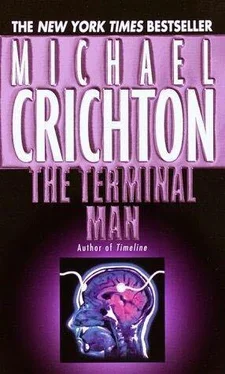Michael Crichton - The Terminal Man
Здесь есть возможность читать онлайн «Michael Crichton - The Terminal Man» весь текст электронной книги совершенно бесплатно (целиком полную версию без сокращений). В некоторых случаях можно слушать аудио, скачать через торрент в формате fb2 и присутствует краткое содержание. Жанр: Фантастика и фэнтези, на английском языке. Описание произведения, (предисловие) а так же отзывы посетителей доступны на портале библиотеки ЛибКат.
- Название:The Terminal Man
- Автор:
- Жанр:
- Год:неизвестен
- ISBN:нет данных
- Рейтинг книги:3 / 5. Голосов: 1
-
Избранное:Добавить в избранное
- Отзывы:
-
Ваша оценка:
- 60
- 1
- 2
- 3
- 4
- 5
The Terminal Man: краткое содержание, описание и аннотация
Предлагаем к чтению аннотацию, описание, краткое содержание или предисловие (зависит от того, что написал сам автор книги «The Terminal Man»). Если вы не нашли необходимую информацию о книге — напишите в комментариях, мы постараемся отыскать её.
The Terminal Man — читать онлайн бесплатно полную книгу (весь текст) целиком
Ниже представлен текст книги, разбитый по страницам. Система сохранения места последней прочитанной страницы, позволяет с удобством читать онлайн бесплатно книгу «The Terminal Man», без необходимости каждый раз заново искать на чём Вы остановились. Поставьте закладку, и сможете в любой момент перейти на страницу, на которой закончили чтение.
Интервал:
Закладка:
"No," she said, "he didn't kill me. But he would have."
"What happened?"
"I turned on the oven."
Anders looked puzzled. "Is that a cure for epilepsy?"
"Hardly. But it affected Benson's electronic machinery. I have a microwave oven. Microwave radiation screws up pacemaking machinery. It's a big problem for cardiac pacemakers now. Dangers of the kitchen. There have been a lot of recent articles."
"Oh," Anders said.
He left the room to make some calls, while she dressed.
She chose a black turtleneck sweater and a gray skirt, and stepped back to look at herself in the mirror. The bruises were hidden. Then she noticed the colors, black and gray. That wasn't like her. Too somber, too dead and cold. She considered changing, but didn't.
She heard Anders talking on the phone in the living room.
She went out to the kitchen to make herself a drink - no more coffee; she wanted Scotch on the rocks - and as she poured it, she saw the long scratches in the wooden counter that her fingernails had left. She looked at her fingernails. Three of them were broken; she hadn't noticed before.
She made the drink and went out to sit in the living room.
"Yes," Anders was saying into the phone. "Yes, I understand. No… no idea. Well, we're trying." There was a long pause.
She went to the broken window and looked out at the city. The sun was up, lighting a dark band of brown air that hung above the buildings. It was really a lethal place to live, she thought. She should move to the beach where the air was better.
"Well, listen," Anders said angrily, "none of this would have happened if you'd kept that fucking guard at his door in the hospital. I think you better keep that in mind."
She heard the phone slam down, and turned.
"Shit," he said. "Politics."
"Even in the police department?"
"Especially in the police department," he said. "Anything goes wrong, and suddenly there's a scramble to see who can get stuck with it."
"They're trying to stick you?"
"They're trying me on for size."
She nodded, and wondered what was happening back at the hospital. Probably the same thing. The hospital had to maintain its image in the community; the chiefs of service would be in a sweat; the director would be worrying about fund-raising. Somebody at the hospital would get stuck. McPherson was too big; she and Morris were too small. It would probably be Ellis - he was an assistant professor. If you fired an assistant professor it had connotations of firing a temporary appointment who had proven himself too aggressive, too reckless, too ambitious. Much better than firing a full professor, which was very messy and reflected badly on the earlier decision that had given him tenure.
It would probably be Ellis. She wondered if he knew. He had just recently bought a new house in Brentwood. He was very proud of it; he had invited everyone in the NPS to a housewarming party next week. She stared out the window, through the shattered glass.
Anders said, "Listen, what does epilepsy have to do with cardiac pacemakers?"
"Nothing," she said, "except that Benson has a brain pacemaker, very similar to a cardiac pacemaker."
Anders flipped open his notebook. "You better start from the beginning," he said, "and go slowly."
"All right." She set down her drink. "Let me make one call first."
Anders nodded, sat back, and waited while she called McPherson. Then, as calmly as she could, she explained everything she knew to the policeman.
McPherson hung up the telephone and stared out his office window at the morning sun. It was no longer pale and cold; there was the full warmth of morning. "That was Ross," he said.
Morris nodded from the corner. "And?"
"Benson came to her apartment. She lost him."
Morris sighed.
"It doesn't seem to be our day," McPherson said. He shook his head, not taking his eyes off the sun. "I don't believe in luck," he said. He turned to Morris. "Do you?"
Morris was tired; he hadn't really been listening. "Do I what?"
"Believe in luck."
"Sure. All surgeons believe in luck."
"I don't believe in luck," McPherson repeated, "Never did.
I always believed in planning." He gestured to the charts on his wall, then lapsed, staring at them.
The charts were large things, four feet across, and intricately done in many colors. They were really glorified flow charts with timetables for technical advances. He had always been proud of them. For instance, in 1967 he had examined the state of three areas - diagnostic conceptualization, surgical technology, and microelectronics - and concluded that they would all come together to allow an operation for psychomotor epilepsy in July of 1971. They had beaten his estimate by four months, but it was still damned accurate.
"Damned accurate," he said.
"What?" Morris said.
McPherson shook his head. "Are you tired?"
"Yes."
"I guess we're all tired. Where's Ellis?"
"Making coffee."
McPherson nodded. Coffee would be good. He rubbed his eyes, wondering when he would be able to sleep. Not for a while - not until they had Benson back. And that could take many hours more, perhaps another day.
He looked again at the charts. Everything had been going so well. Electrode implantation four months ahead of schedule. Computer simulation of behavior almost nine months ahead - but that, too, was having problems. George and Martha programs were behaving erratically. And Form Q?
He shook his head. Form Q might never get off the ground now, although it was his favorite project, and had always been. Form Q on the flow chart for 1979, with human application beginning in 1986. In 1986 he would be seventy-five years old - if he was still alive - but he didn't worry about that. It was the idea, the simple idea, that intrigued him.
Form Q was the logical outgrowth of all the work at the NPS. It began as a project called Form Quixoticus, because it seemed so impossible. But McPherson felt certain that it would happen because it was so necessary. For one thing, it was a question of size; for another, a question of expense.
A modern electronic computer - say, a third-generation IBM digital computer - would cost several million dollars. It drew an enormous amount of power. It consumed space voraciously. Yet the largest computer still had the same number of circuits as the brain of an ant. To make a computer with the capacity of a human brain would require a huge skyscraper. Its energy demands would be the equivalent of a city of half a million.
Obviously, nobody would ever try to build such a computer using current technology. New methods would have to be found - and there wasn't much doubt in McPherson's mind what the methods would be.
Living tissues.
The theory was simple enough. A computer, like a human brain, was composed of functioning units - little flip-flop cells of one kind or another. The size of those units had shrunk considerably over the years. They would continue to shrink as large-scale integration and other microelectronic techniques improved. Power requirements would also decrease. But the individual units would never become as small as a nerve cell, a neuron. You could pack a billion nerve cells into one cubic inch. No human miniaturization method would ever achieve that economy of space. Nor would any human method ever produce a unit that operated on so little power as a nerve cell.
Therefore, make your computers from living nerve cells. It was already possible to grow isolated nerve cells in tissue culture. It was possible to alter them artificially in different ways. In the future, it would be possible to grow them to specification, to make them link up in specified ways.
Once you could do that, you could make a computer that was, say, six cubic feet in volume, but contained thousands of billions of nerve cells. Its energy requirements would not be excessive; its heat production and waste products would be manageable. Yet it would be the most intelligent entity on the planet, by far.
Читать дальшеИнтервал:
Закладка:
Похожие книги на «The Terminal Man»
Представляем Вашему вниманию похожие книги на «The Terminal Man» списком для выбора. Мы отобрали схожую по названию и смыслу литературу в надежде предоставить читателям больше вариантов отыскать новые, интересные, ещё непрочитанные произведения.
Обсуждение, отзывы о книге «The Terminal Man» и просто собственные мнения читателей. Оставьте ваши комментарии, напишите, что Вы думаете о произведении, его смысле или главных героях. Укажите что конкретно понравилось, а что нет, и почему Вы так считаете.









